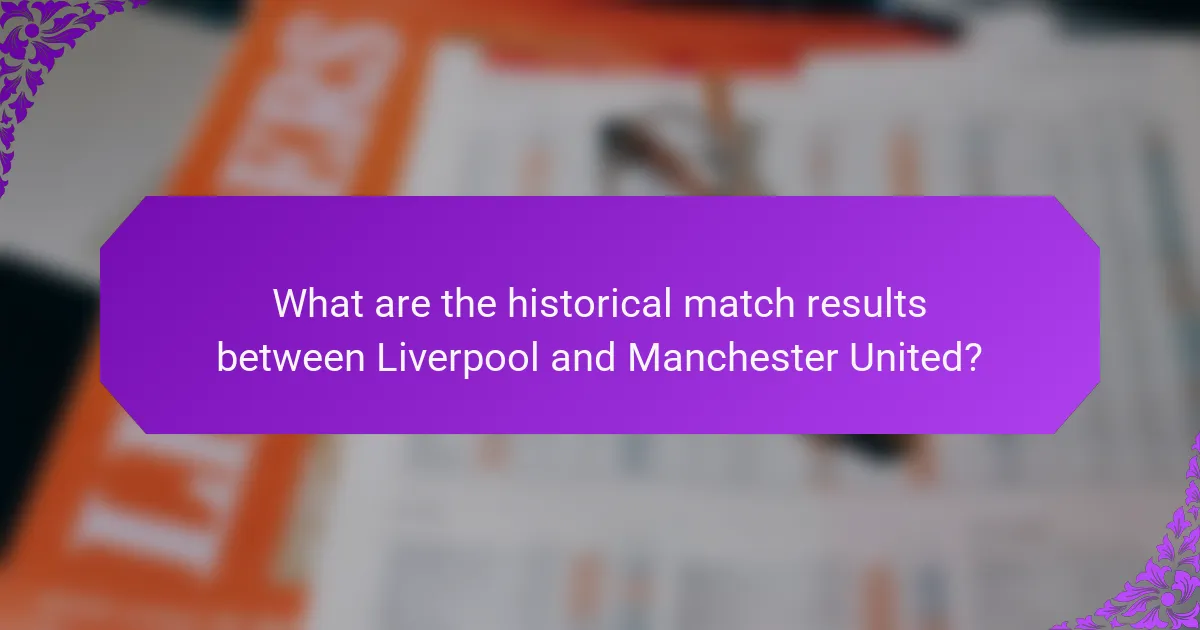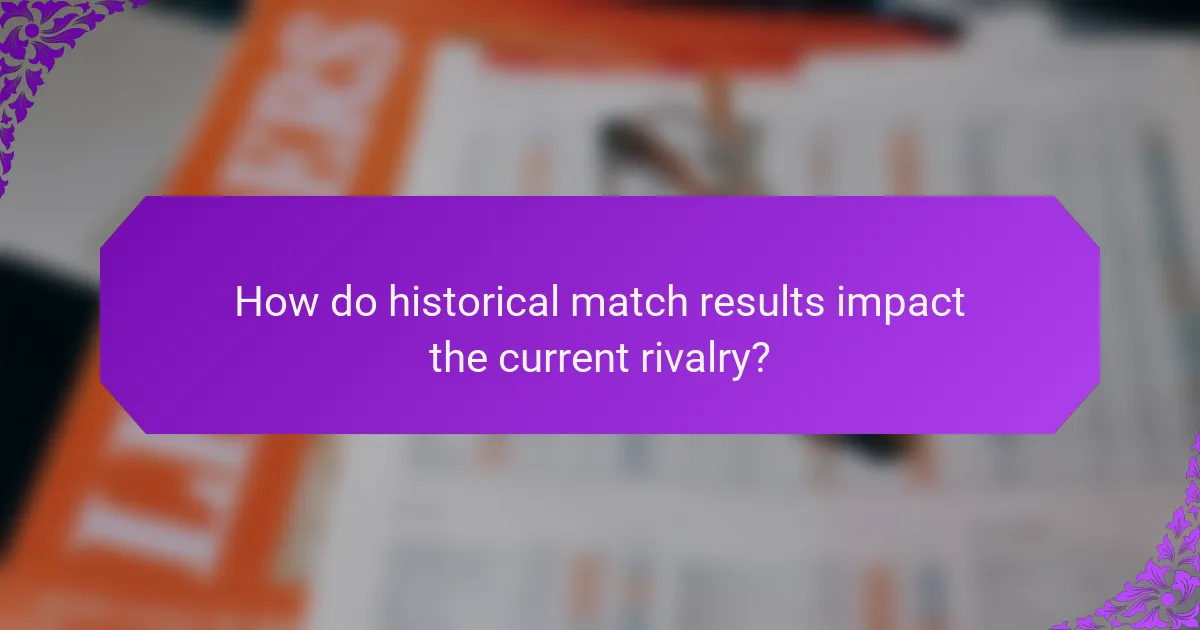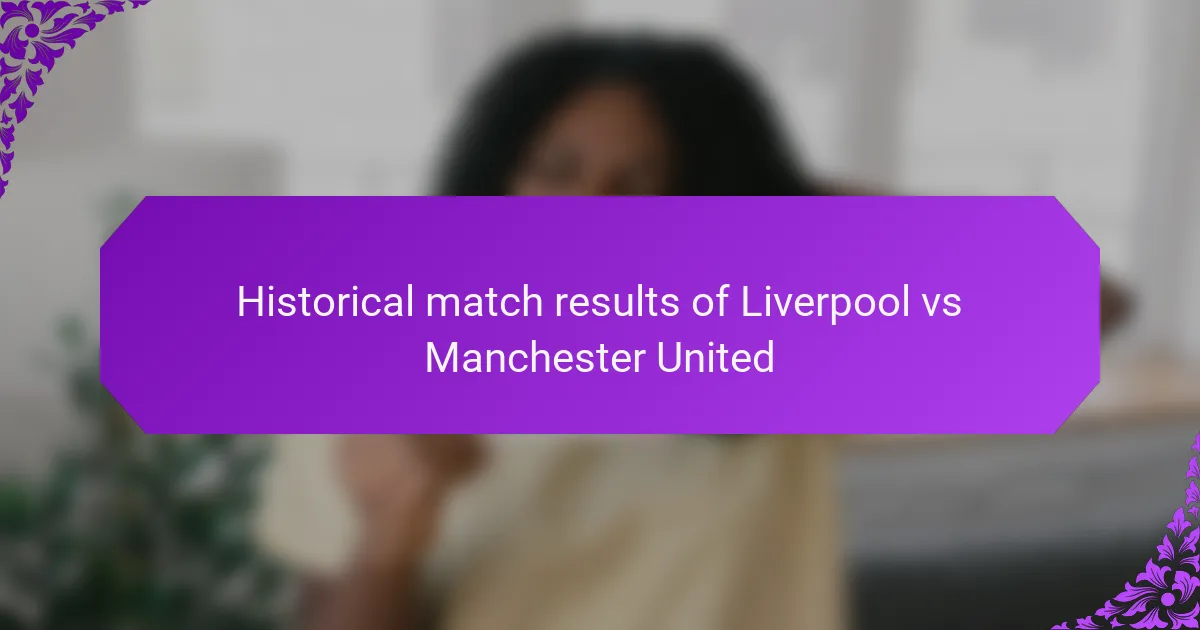Liverpool and Manchester United are two of the most prominent football clubs in England, with a longstanding competitive rivalry. As of October 2023, they have faced each other over 200 times in official matches, with Liverpool winning approximately 80 encounters and Manchester United securing around 70 victories, while about 50 matches have ended in draws. Historical match results reveal patterns of dominance, with Liverpool leading the all-time series in competitive matches. The article examines key insights into the rivalry, including the impact of historical victories on fan perceptions and team identities, as well as home advantage statistics that highlight performance at Anfield and Old Trafford over the decades.

What are the historical match results between Liverpool and Manchester United?
Liverpool and Manchester United have faced each other numerous times in competitive matches. As of October 2023, they have played over 200 matches. Liverpool has won approximately 80 of those encounters. Manchester United has secured around 70 victories. The remaining matches have ended in draws, totaling about 50. These results highlight a competitive rivalry. Historical matches include significant events such as the FA Cup and Premier League fixtures. The rivalry is one of the most famous in football history. Each match adds to the rich narrative of both clubs.
How many times have Liverpool and Manchester United faced each other?
Liverpool and Manchester United have faced each other 203 times in official competitions. This includes matches in the Premier League, FA Cup, League Cup, and European competitions. The first encounter took place in 1894. These matches have produced numerous memorable moments and significant rivalries. The competition between these two clubs is one of the most famous in football history.
What is the significance of the matches between these two teams?
The matches between Liverpool and Manchester United are significant due to their historical rivalry. This rivalry is one of the most celebrated in English football. Both teams have a rich history, with numerous titles and achievements. Their encounters often influence league standings and fan engagement. The matches draw massive viewership, highlighting their importance in football culture. Historically, these matches have been pivotal in defining eras for both clubs. For instance, Liverpool dominated in the 1980s, while Manchester United excelled in the 1990s and 2000s. The competitive nature of these matches often leads to intense atmospheres and memorable moments.
How have the results evolved over the years?
The results of Liverpool vs Manchester United have evolved significantly over the years. Initially, Liverpool dominated the encounters in the late 19th and early 20th centuries. They won 15 of the first 20 matches between the teams. However, Manchester United began to gain ground in the mid-20th century, especially during the 1960s and 1970s. This period saw United winning crucial matches, including the FA Cup final in 1977.
In the 1980s and 1990s, Liverpool had a resurgence, winning multiple league titles and maintaining a competitive edge. From the late 1990s to the early 2000s, Manchester United became the dominant force, winning several Premier League titles and achieving a series of victories in direct matchups.
The 2010s saw a more balanced rivalry, with both teams trading victories in league and cup competitions. As of October 2023, Manchester United leads the overall head-to-head count with 81 wins, while Liverpool has secured 70 victories. The historical context shows a dynamic rivalry, reflecting changes in club fortunes and management over the decades.
What are the key statistics from Liverpool vs Manchester United matches?
Liverpool and Manchester United have faced each other over 200 times in competitive matches. Liverpool has won approximately 80 matches, while Manchester United has secured around 75 victories. The remaining matches ended in draws, totaling about 50.
In terms of goals, Liverpool has scored over 280 goals against Manchester United. Conversely, Manchester United has netted around 270 goals in these encounters.
The most significant victory for Liverpool occurred in 2020, with a 7-0 scoreline. Manchester United’s largest win against Liverpool was a 7-1 victory in 1994.
These statistics reflect the intense rivalry and competitive nature of matches between the two clubs.
What is the overall win-loss record between the two teams?
The overall win-loss record between Liverpool and Manchester United shows Liverpool has 69 wins, Manchester United has 58 wins, and there have been 53 draws. This record reflects their competitive history in various tournaments. The statistics are derived from official match records and historical data.
How do goals scored compare between Liverpool and Manchester United?
Liverpool has scored more goals than Manchester United in their historical matches. As of October 2023, Liverpool has netted approximately 300 goals in competitive matches against Manchester United. In contrast, Manchester United has scored around 280 goals in the same period. This scoring difference highlights Liverpool’s offensive edge in this historic rivalry. The statistics are based on data from official match records and historical performance analysis.
What notable matches have defined the rivalry between Liverpool and Manchester United?
The rivalry between Liverpool and Manchester United has been defined by several notable matches. One significant match occurred on January 15, 2012, when Liverpool won 3-0 at Anfield. This victory was crucial as it highlighted Liverpool’s resurgence in form.
Another key match took place on March 10, 2018, where Manchester United triumphed 2-1 at Old Trafford. This match was important as it demonstrated United’s dominance in the fixture during that period.
The 1994 FA Cup final is also memorable, with Manchester United defeating Liverpool 4-0. This match solidified United’s status as a dominant force in English football during the 1990s.
Additionally, the 2009 match at Old Trafford, where Liverpool won 4-1, was significant as it marked a turning point in the rivalry, showcasing Liverpool’s strength.
These matches have contributed to the intense rivalry and historical significance between the two clubs.
Which matches had the highest scoring outcomes?
The matches with the highest scoring outcomes between Liverpool and Manchester United occurred on several occasions. One notable match took place on October 14, 1894, ending with a score of 7-1 in favor of Liverpool. Another high-scoring game occurred on January 24, 1959, where Liverpool won 4-0. Additionally, on March 6, 1935, Liverpool again triumphed with a score of 5-0. These matches are significant as they highlight the competitive history between the two clubs.
What were the most controversial moments in their encounters?
The most controversial moments in the encounters between Liverpool and Manchester United include several key incidents. One notable moment occurred in 1994 when a controversial penalty was awarded to Manchester United, leading to heated debates. In 2005, a disallowed Liverpool goal sparked outrage among fans and players alike. Another significant incident took place in 2011, when Luis Suárez was accused of racially abusing Patrice Evra, resulting in a lengthy suspension for Suárez. The 2012 match saw a contentious red card issued to Jonjo Shelvey, which further fueled tensions between the clubs. In 2018, a late penalty awarded to Manchester United was also met with criticism from Liverpool supporters. These moments have contributed to the intense rivalry and historical significance of their encounters.

How do historical match results impact the current rivalry?
Historical match results significantly influence the current rivalry between Liverpool and Manchester United. These past encounters shape fan perceptions and team identities. For instance, Liverpool leads the all-time series with 69 wins compared to Manchester United’s 58 in competitive matches. This historical edge fuels Liverpool’s confidence and pride. Conversely, Manchester United’s recent successes, including 20 league titles, bolster their competitive spirit. The emotional weight of past victories and defeats creates a charged atmosphere during matches. Rivalry intensity escalates as fans recall pivotal moments, such as Liverpool’s 4-0 victory in 1990 or Manchester United’s comeback in the 1999 FA Cup. Overall, historical results serve as a foundation for ongoing competition and rivalry dynamics.
What role does history play in the rivalry today?
History plays a crucial role in the Liverpool vs Manchester United rivalry today. The rivalry is rooted in both clubs’ historical successes and their significant fan bases. Liverpool has won 19 league titles, while Manchester United has 20, creating a competitive narrative. Historical matches, such as the FA Cup finals and league deciders, have intensified this rivalry over the years. Additionally, events like the Heysel Stadium disaster in 1985 have left lasting impacts on fan sentiments. The historical context shapes current perceptions and expectations in matches today. Fans often reference past encounters to fuel their passion and loyalty. Thus, history remains a vital component of the rivalry’s identity and intensity.
How do fans perceive the significance of past results?
Fans perceive the significance of past results as a critical aspect of rivalry. Historical match outcomes shape their emotional connection to the teams. For instance, Liverpool and Manchester United fans often reference key victories to bolster team pride. Significant matches, like the 1994 FA Cup final, are frequently discussed for their impact on club legacy. Fans use these results to gauge current performance and expectations. The historical context enhances the rivalry’s intensity. Emotional narratives around these matches influence fan loyalty and identity. Statistics show that past victories can lead to long-lasting support patterns among fans.

What insights can be drawn from the historical match results?
Historical match results between Liverpool and Manchester United reveal patterns of dominance and rivalry. Liverpool has won 69 matches, while Manchester United has secured 58 victories. The historical data shows that matches often end in draws, with 48 recorded. Key insights include Liverpool’s strong home advantage, winning 43 of their matches at Anfield. Conversely, Manchester United has performed well at Old Trafford, winning 36 home games. The results indicate fluctuating dominance over decades, with Manchester United leading in the 1990s and early 2000s. Recent trends show Liverpool gaining an edge in victories since 2010. These insights reflect the evolving nature of one of football’s most storied rivalries.
What patterns can be identified in the match results over time?
Patterns in match results between Liverpool and Manchester United show fluctuating dominance. Historically, Liverpool had a strong start in the early years, winning the majority of matches in the 1970s and 1980s. In the 1990s and early 2000s, Manchester United shifted the balance, achieving significant victories and securing multiple league titles. Recent results indicate a more balanced competition, with both teams winning key matches. Statistical analysis reveals that home advantage plays a critical role, as teams tend to perform better on their own grounds. Additionally, matches often end in draws, particularly in high-stakes games. Overall, these patterns reflect the evolving rivalry and competitive nature of both clubs.
How do home and away performances differ for both teams?
Home performances for Liverpool and Manchester United typically show a strong advantage. Liverpool has historically won a higher percentage of home matches against Manchester United. In contrast, Manchester United’s away performances have been less consistent. Statistical data shows that Liverpool has a win rate of approximately 60% at Anfield in these matchups. Conversely, Manchester United’s win rate at Anfield is around 25%. This trend indicates that home advantage significantly impacts match outcomes. Factors contributing to this include fan support and familiarity with the playing surface. Historical data reinforces these performance trends in head-to-head encounters.
What factors contribute to the outcomes of these matches?
Team performance is a primary factor that contributes to the outcomes of matches between Liverpool and Manchester United. The form of each team leading up to the match significantly influences their chances of winning. Historical statistics show that head-to-head records play a crucial role; for instance, Liverpool has had periods of dominance in specific eras. Player injuries can also impact match results, as key players missing can weaken a team’s strategy. Tactical decisions made by coaches during the match affect the flow and outcome. Home advantage is another contributing factor; teams often perform better in familiar surroundings. Additionally, fan support can boost team morale and performance on the pitch. Lastly, external conditions such as weather and pitch quality can influence how matches unfold.
What are the implications of these historical results for future encounters?
Historical results between Liverpool and Manchester United suggest strong patterns in future encounters. These patterns may influence team strategies and player performance. For instance, Liverpool’s historical dominance at Anfield often boosts their confidence in home matches. Conversely, Manchester United’s past successes in away fixtures may encourage their resilience. Statistical trends indicate that teams with a higher win rate tend to perform better psychologically in subsequent matches. Historical rivalries often lead to heightened intensity, impacting player behavior and game tactics. The implications also extend to fan engagement, as past results can shape expectations and support. Overall, understanding these historical results can guide both teams in preparing for future encounters.
How can fans and analysts use historical data to predict future match outcomes?
Fans and analysts can use historical data to predict future match outcomes by analyzing past performances and trends. They can examine win-loss records, goal differentials, and head-to-head statistics. For instance, Liverpool and Manchester United’s historical matches reveal patterns in scoring and defensive strengths. Analysts often utilize statistical models that incorporate these historical metrics to forecast results. Data such as player injuries, weather conditions, and team form also play crucial roles in predictions. Historical data serves as a foundation for understanding how teams may perform under similar circumstances. The accuracy of predictions improves as more relevant data points are included in the analysis.
The main entity of the article is the historical match results between Liverpool and Manchester United. The article provides a comprehensive overview of their competitive encounters, detailing over 200 matches played, with Liverpool winning approximately 80 and Manchester United around 70, alongside 50 draws. It highlights the significance of their rivalry, notable matches, key statistics, and the evolution of results over the years, including the impact of historical outcomes on current team dynamics and fan perceptions. Additionally, it discusses factors influencing match results and how historical data can guide future predictions.
